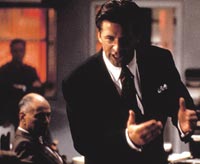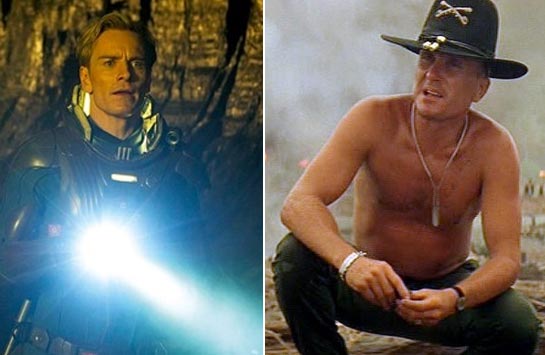 Michael C here. On my list of cinematic obsessions the Alec Baldwin scene from Glengarry Glenn Ross ranks near the top, alongside stuff like the zither music from The Third Man and the ending of Barton Fink. Part of that obsession is my ironclad belief that Baldwin should have won the Supporting Oscar hands down, no contest.
Michael C here. On my list of cinematic obsessions the Alec Baldwin scene from Glengarry Glenn Ross ranks near the top, alongside stuff like the zither music from The Third Man and the ending of Barton Fink. Part of that obsession is my ironclad belief that Baldwin should have won the Supporting Oscar hands down, no contest.
Those who disagree could justifiably point to the complexity of Gene Hackman's and Jaye Davidson's nominated performances that year in Unforgiven and The Crying Game, or, for that matter, the greater range shown by Alec's Glengarry co-star Al Pacino. Baldwin's performance shows no such range. We don't see his softer side, he doesn't reveal any hidden dimensions, we don't even learn his name. He just struts in and delivers a seven minute tour de force of invective.
It's an unforgettable scene but is that enough? Can a one-note performance truly be considered great?
This discussion cropped up earlier this year when Michael Fassbender's supporting turn emerged as the clear stand out from Prometheus. All the praise came with the caveat that as an android, his role lacks the range to attract any real awards attention. To this I would ask, does not the limited nature of the role make his work more impressive? Isn't it a remarkable achievement to hold the audience's fascination while staying inside the confines of playing a machine?
 Are intrinsically limited characters limitless with the right actors?
Are intrinsically limited characters limitless with the right actors?
Acting, as we've so often heard, is about making choices, so in the right role is it not sometimes the stronger choice to refuse to show additional sides of a character? Look at Robert Duvall's Colonel Kilgore in Apocalypse Now. Would it make the character stronger if he dropped that guy's invincible confidence to show a few moments of vulnerability? Of course not. That would have been disastrous.
Or better yet, look at Full Metal Jacket's R Lee Ermey. There's a guy who finds precisely one note and hammers on it down to his last second of screen time. At the time, audience's could be forgiven for wondering if Ermey could act at all, or if he could merely dole out colorfully obscene abuse on command. We now know from his work in films like Dead Man Walking that he is a perfectly capable actor, and time has shown that his choices in Jacket to be the correct ones. I will never forget the impact when it became clear during his final confrontation with Vincent D'Onofrio that the bastard was still - still - not going to soften one iota even when faced with a psychotic soldier pointing a loaded gun at him. And isn't leaving a lasting impact on the viewer what great acting is all about?
What's your take on this? Are certain performances barred from top tier status by their narrow scope, or can the right actor be brilliant in even the most limited of roles, a la Dustin Hoffman in Rain Man?. Let us know in the comments.

You can follow Michael C. on Twitter at @SeriousFilm. Or read his blog Serious Film.